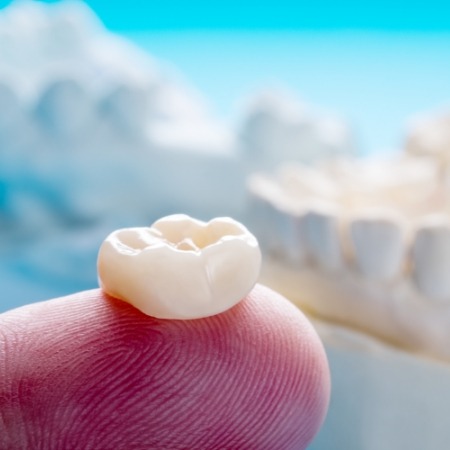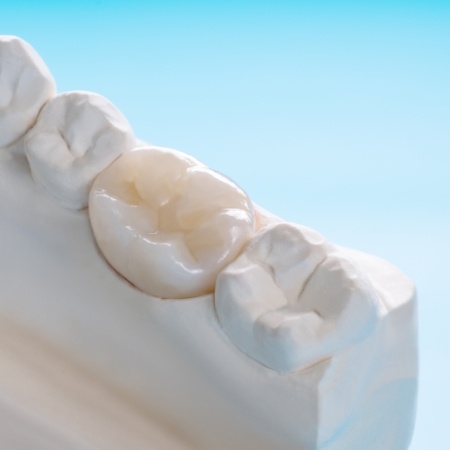Dental Crowns Port Orange
Restoring the Strength & Function of Damaged Teeth
Hearing that you need a dental crown in Port Orange can be discouraging because it means that your smile won’t be completely natural. However, at Water’s Edge Dental, we offer natural-looking, durable dental crowns that will keep your smile functioning and looking great. Dental crowns are one of the most common dental treatments around because they’re versatile and help protect and maintain natural teeth. Our Team strives to help his patients preserve and maintain their oral health, which is why he always attempts to protect and save damaged teeth from further harm.
Why Choose Water’s Edge Dental for Dental Crowns?
- Advanced Dental Technology Streamlines Process
- Friendly Dentist with Years of Experience
- Beautiful, Durable Materials Used
What are Dental Crowns?

Dental crowns are sometimes referred to as “caps” because they fit over the visible portion of your natural tooth to help strengthen and protect it. They’re incredibly versatile restorations and can be used to help replace missing teeth or fix a variety of oral health problems. They act to restore the shape, size, and structure of damaged teeth so you can eat and speak more comfortably.
Crowns can be made from a variety of materials, including porcelain, porcelain fused to metal, gold, and metal alloys. However, most patients prefer natural-looking crowns that can be customized to flawlessly incorporate with the rest of your smile. These are typically made from porcelain, because the material reflects natural light, just like your tooth enamel does.
Why Do You Need a Dental Crown?

Many patients aren’t aware of how many different oral issues dental crowns can remedy. Our Team often recommends dental crowns to patients who face the following problems:
- Tooth Decay: If a dental filling isn’t strong enough to restore and repair a decayed tooth, a crown will be placed over it for added protection.
- Dental Trauma: For teeth that are severely broken or cracked, a dental crown can be placed over the top of them to restore their strength and eliminate any sensitivity.
- Root Canal Therapy: After the infected pulp of a tooth has been removed from the inner chamber via root canal therapy, our team will top it off with a customized crown for extra support and protection.
- Fixed Bridges: Crowns can be used to replace missing teeth by anchoring fixed bridges in place.
The Process of Getting a Crown

When you get a dental crown in Port Orange, it typically takes place over the course of two appointments and a few steps. Here’s what you can expect from the procedure:
- Before your crown can be made or placed, we will prepare your natural tooth by removing a small portion of the outer layer so the restoration can seamlessly fit over the top of it and integrate with the rest of your smile.
- We’ll take impressions of your tooth to send to our dental laboratory, which will make your permanent crown.
- So you don’t have to walk around with your prepared tooth, we’ll place a temporary crown until your permanent one arrives at our office.
- Once we receive your crown from our dental laboratory, we’ll permanently secure it to your natural tooth and make any final adjustments.
If you have any questions about getting a dental crown, be sure to contact our office. We’ll be more than happy to schedule a consultation so we can conduct a thorough examination of your mouth and walk you through the process.
Dental Crown FAQs
Does It Hurt to Get a Dental Crown?
At the first appointment, we’ll need to prepare the tooth that’s receiving the dental crown. We will numb the area around the tooth in question to keep you comfortable; sedation may also be used if you suffer from dental anxiety.
When it comes to placing the crown, it’s not always necessary to numb your mouth. However, you might experience some sensitivity for a few days after the procedure. You can take ibuprofen or another over-the-counter pain reliever if you need to.
How Long Do Dental Crowns Last?
Generally speaking, the lifespan of a dental crown depends on what material it’s made of and what kind of care it receives. Typically, you can expect your crown to last between 5 to 15 years. Since crowns on your front teeth tend to experience less wear and tear from chewing, they may last slightly longer than crowns on your molars.
There are a few steps you can take to help your crown last longer, such as:
- Practicing good oral hygiene – as in, brushing two times a day and flossing once a day.
- Limiting your intake of hard or sticky foods that can damage crowns.
- Avoiding bad oral habits like smoking or chewing the end of your pen.
How Do You Know When a Dental Crown Needs to Be Replaced?
You likely need a new dental crown if:
- You’re experiencing pain in the tooth underneath the crown.
- The current crown feels loose, especially when you try to bite something.
- The current crown is chipped, cracked, discolored, or otherwise damaged.
If you’ve noticed any of the above issues with your crown, call us right away to schedule an appointment. We can visually examine the area and take any necessary X-rays to determine whether it’s time to replace your restoration.
Are Dental Crowns Covered by Insurance?
Not all dental plans are alike, so you should confirm the specifics of your coverage with your insurance carrier. Generally speaking, though, crowns are classified as a major procedure under most plans, so you can usually expect around 50% coverage. The amount your insurance company pays might vary depending on factors such as whether you’ve met your deductible.
Bear in mind that a crown placed for purely cosmetic reasons likely won’t be covered; dental insurance typically only pays for treatments that are medically necessary.
